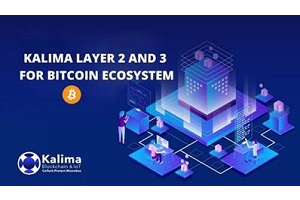Kalima & Kerlink to demo accelerated adoption of smart contracts for enterprise at Surfin’ Bitcoin event

Paris and Thorigne-Fouillard, France. 11 August, 2022 – During the Surfin’ Bitcoin event, which will be held in Biarritz from 25 August to 27 2022, Kalima, a provider of blockchain solutions for enterprise and the internet of things and Kerlink, a specialist in solutions dedicated to the internet of things (IoT), will perform a technical demonstration of the combination of blockchain and cryptocurrencies for the execution of Smart Contracts, to accelerate their adoption by enterprises.
IoT and enterprise-oriented Smart Contracts using Bitcoin, through the Lightning Network
The Lightning Network is a layer 2 decentralised network designed for instant micropayments on Bitcoin. Layer 2 solutions act as the overlay of an already existing blockchain and solve the problems of transaction scalability and speed that the main blockchain (layer 1) cannot address effectively enough. This feature of the Lightning Network technically enables users to realise instant, high-volume micropayments in Bitcoins. Until now, no technical solution has met this need for Smart Contracts in the Bitcoin network.
Kalima and Kerlink are working together on a new solution for Smart Contracts, based on the Kalima blockchain industrial protocol, specifically designed for enterprises and IoT, which will enable Lightning Network (Bitcoin) microtransactions. The goal is simple: make Bitcoin payments possible using the Lightning Network layer and authenticate/secure enterprise and IoT data, thanks to Kalima Smart Contracts put in place.
The Kalima protocol therefore brings the ability to embed blockchain in connected objects, to directly process the data in the sensor, and to add value to it (for example contextualisation), considering its native authenticated and traceable nature. The differentiator of Kalima lies in its ability to run its Smart Contracts at the edge, and thus process data at the closest point in the company’s processes (the sensor), rather than having a cluster of data stored and processed in the cloud.
The Kalima Smart Contracts then work “on top” of the Lightning Network, and the data is kept outside of Bitcoin transactions and of circuits and nodes that make up the Lightning Network. Calling it a Layer 3 solution for Bitcoin offered by the Kalima protocol would even make sense, given the protocol’s features.
On this basis, Kalima and Kerlink will demonstrate a technical proof-of-concept (POC), in which a Kalima-embedded Kerlink LoRaWAN gateway will manage “on-chain” data. The gateway will grant the transmission of data collected by sensors to the central platform in charge of data analysis (cloud computing scenario), or the processing and filtering of data at the edge (within the gateways), and the transmission of crucial data only (Edge computing scenario).
In this solution:
- The Bitcoin blockchain is used to manage and guarantee property rights, access rights and avoid double-spending problems,
- The Lightning Network is used to scale micro-payment transactions (speed and volume), and
- The Kalima / Kerlink combination adds value to the gateway, limiting resource consumption and delivering response times and transaction volumes compatible with industry requirements.
Technical demonstration based on a real-world experience at Surfin’ Bitcoin
From Aug. 25 to 27, during the Surfin’ Bitcoin event in Biarritz, Kalima and Kerlink will show a concrete IoT use case of Smart Contracts for Lightning Network and Bitcoin.
The workshop will demonstrate how the Kalima protocol, through the execution of Smart Contracts in a Kerlink LoRaWAN gateway, can trigger micropayments in Bitcoin on the Lightning Network, fitting IoT scenarios and parameters.
The focus of the PoC will be set on the protection of employees and workers, and more particularly on the issue of internal air quality (IAQ) management within companies’ working spaces. The scenario will highlight how the degradation of air quality is detected by a sensor that instantly transmits the alert to the company. Upon the reception of this alert, the company will be instructed to immediately take the necessary and appropriate measures to effectively respond to this degradation. A simple response from the team, such as ventilating the building by opening the windows, will quickly bring the IAQ back to its normal level. This active behavior of regularly improving the air quality in the building, will then be rewarded, in this case with Bitcoin granted to the buildings’ management team(s).

This workshop will concretely illustrate the real-world technical feasibility of the Kalima / Kerlink solution and will present a simple and virtuous use case, made possible by this technical enabler.
This solution, which is expected to be launched in the second half of 2023, can support many use cases that would propose Bitcoin as the basis of a new smart rewarding system, powered by the Kalima protocol.
Comment on this article below or via Twitter @IoTGN
